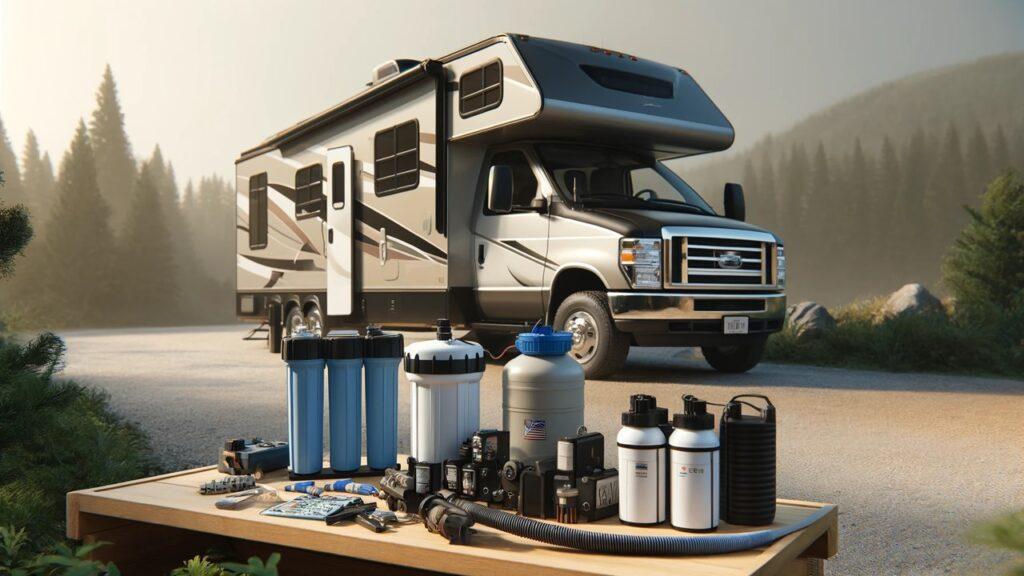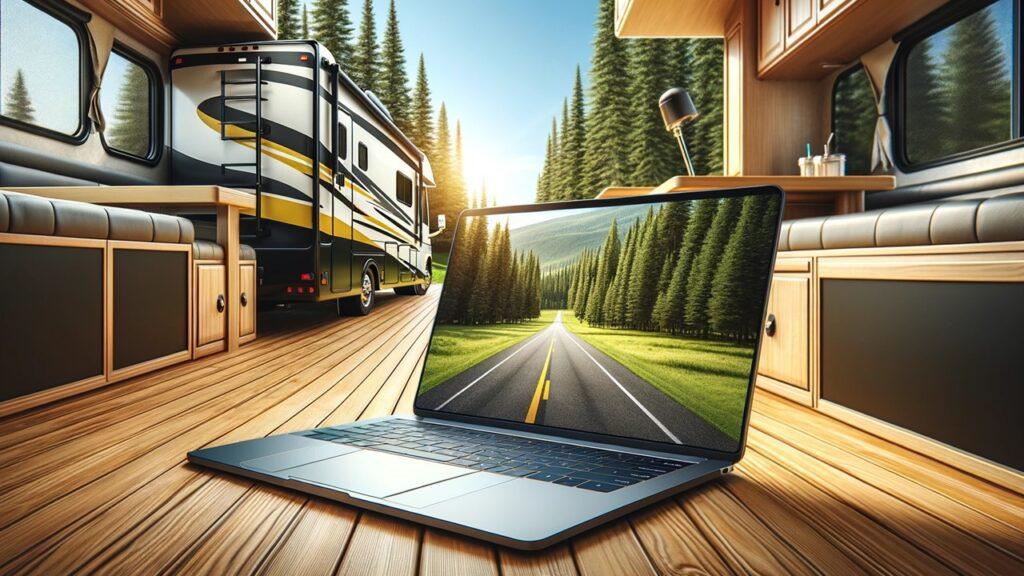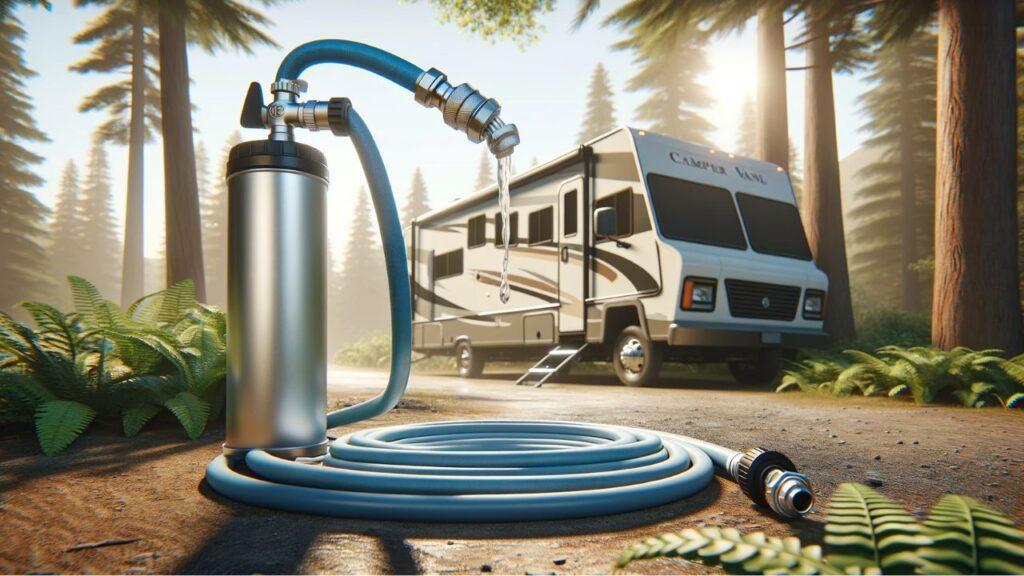
Traveling in an RV is a thrilling way to explore new places and experience the open road. But to ensure safe water on road adventures, it’s essential to address potential contaminants from various sources. Whether you’re filling up from a campground tap, a well, or another natural source, impurities such as bacteria, chemicals, and sediments can pose a risk. That’s why a detailed guide to RV water filtration systems for safe water on road adventures is crucial for motorhome enthusiasts. Effective filtration systems ensure you have clean water for drinking, cooking, and cleaning, providing peace of mind as you enjoy your travels. Moreover, choosing the right system can safeguard your health and enhance your journey, making each stop more enjoyable.
Types of Water Filtration Systems for RVs
Embarking on a road adventure in your RV calls for safe drinking water, a crucial companion for every journey. As you travel from one scenic location to another, the water you consume needs to be free from contaminants that could mar your experience. A robust RV water filtration system ensures that regardless of the source, your water is always pristine and safe.
Sediment Filters
At the heart of any basic filtration system are sediment filters. These filters trap particles such as dirt, sand, and silt, which are commonly found in water sourced from campsites or natural reserves. By functioning as the first line of defense, sediment filters protect finer filters downstream from clogging too quickly. For camper van enthusiasts, sediment filters are indispensable, preserving both water quality and system durability.
Carbon Filters
Next up, carbon filters use a bed of activated carbon to remove contaminants and impurities, primarily focusing on improving the taste and odor of water in RVs. This technology excels in adsorbing chlorine and organic compounds, making it a popular choice for travelers who prioritize flavor and freshness in their drinking water. Whether you’re parked for a weekend or on a lengthy cross-country tour, having a carbon filter can dramatically enhance your water’s palatability.
Reverse Osmosis Systems
For those who seek the utmost purity, reverse osmosis systems offer a more rigorous solution. These systems work by forcing water through a semi-permeable membrane, effectively stripping it of almost all impurities, including dissolved salts and bacteria. The effectiveness of reverse osmosis makes it a compelling option for trailers and motorhomes alike. However, it’s not without drawbacks; the system demands significant water pressure and produces wastewater, factors that can influence your decision depending on your travel style and water availability.
UV Water Purifiers
UV water purifiers represent the cutting-edge in water treatment technology, especially useful in RVs where space and power are at a premium. By exposing water to UV light, these purifiers deactivate harmful microorganisms, providing a quick and chemical-free way to ensure water safety. The main advantages of UV purifiers include their efficiency and minimal maintenance. Yet, their efficacy is contingent on water clarity, as turbid water can shield organisms from UV exposure.
Choosing the right water filtration system for your RV is not just about meeting your current needs but also adapting to the varying water conditions you may encounter. From sediment and carbon filters to more sophisticated reverse osmosis systems and UV purifiers, each has its place in the arsenal of an RV enthusiast. By understanding these options, you can ensure that your road adventures are safe and refreshing, with clean water always at your fingertips. As you continue to equip your RV, consider exploring other enhancements like RV kitchen faucets or RV drinking water hoses to further improve your travel experience.
Choosing the Right Water Filtration System for Your RV
When planning your next adventure on the open road, ensuring safe drinking water is paramount. A reliable RV water filtration system can make all the difference, but choosing the right one involves several considerations. This section delves into how to assess your needs, ensuring your travels are both comfortable and health-conscious. From understanding your water quality to considering the compatibility and costs, let’s explore how to make an informed decision.
Assessing Your Water Quality Needs
The first step in selecting the right water filtration system is to evaluate your needs. Start by testing the water sources you frequently encounter, whether at campgrounds or roadside stops. Water tests can reveal contaminants like bacteria, chemicals, and heavy metals. Knowing what you’re up against helps determine the level of filtration required. For instance, if tests indicate high chlorine levels, a carbon filter may suffice. In contrast, bacterial contamination may call for a UV purifier or reverse osmosis system. This assessment helps you tailor your filtration system to your specific needs, ensuring safe water throughout your journey.
Compatibility with Your RV
Another critical consideration is how the filtration system fits into your RV setup. Different RV models vary in available space, power requirements, and plumbing configurations. Compact systems such as sediment filters are suitable for smaller RVs with limited room. In contrast, larger motorhomes may accommodate more comprehensive setups, such as a reverse osmosis system or a combination of filters. Additionally, consider the system’s power needs, ensuring it aligns with your RV’s electrical setup, including its RV converter charger or RV power inverter. By evaluating these factors, you can choose a system that integrates seamlessly into your vehicle.
Budget Considerations
Cost is an essential factor when choosing an RV water filtration system. Systems range from basic sediment filters, costing tens of dollars, to comprehensive setups, which can run into hundreds. Beyond the initial cost, consider maintenance expenses and long-term savings. Replacing filters periodically, as well as servicing more complex systems, may add to your budget. However, a reliable filtration system can lead to savings over time, reducing your reliance on bottled water and minimizing potential healthcare costs from contaminated water. Weigh these factors to strike a balance between upfront costs and future benefits.
Selecting the right RV water filtration system is about meeting your needs, integrating with your vehicle, and staying within budget. By assessing your water quality, ensuring system compatibility, and balancing costs, you can make an informed decision. This way, your road adventures are safe and enjoyable, with clean water always at hand. Furthermore, consider how other RV essentials, such as an RV portable waste pump, might complement your setup, enhancing your travels further.
DIY Vs Professional Installation of RV Water Filtration Systems
Ensuring your RV water filtration system is properly installed is key to safe road adventures. Whether you’re opting for a basic filter or a more advanced setup, correct installation protects your water supply and prolongs the life of the system. In this section, we’ll explore DIY installation tips and the role of professional services, helping you decide the best route for your needs.
DIY Installation
If you prefer a hands-on approach, installing a basic filter in your camper van can be straightforward. Start by selecting the right location for your filter, such as near the water inlet or under the sink. Ensure all connections are tight and secure, minimizing leaks. Tools such as wrenches, pipe tape, and screwdrivers may be needed, depending on the system’s complexity. Additionally, carefully follow the manufacturer’s instructions, checking for any specific requirements to ensure a successful installation.
Professional Installation
For more complex systems or those unsure about tackling the job themselves, professional installation is a viable option. Consider professional help when dealing with intricate setups, such as reverse osmosis systems or UV purifiers, which may require specialized knowledge. When choosing a service provider, look for one with experience in RV installations, positive reviews, and appropriate certifications. This way, you can ensure the system is installed correctly, providing safe water for all your travels.
Choosing between DIY and professional installation depends on your confidence and the system’s complexity. By following these guidelines, you can secure a safe water supply for your RV adventures. Furthermore, explore how RV mechanics tool sets or an RV converter charger can support your vehicle, enhancing your travels.
Maintaining Your RV Water Filtration System
Once installed, maintaining your RV water filtration system is crucial for safe and clean water throughout your travels. Regular upkeep ensures the system operates efficiently, preventing issues that could compromise your water quality.
Routine Maintenance Tasks
Maintaining your RV water filtration system involves several key tasks. Regularly clean and replace filters, following the manufacturer’s guidelines. This step prevents clogs and ensures the system effectively removes contaminants. Additionally, inspect the system for leaks or wear, checking connections and seals to prevent water loss or damage. Consistent maintenance not only preserves water quality but also extends the life of your system.
Troubleshooting Common Issues
When issues arise, prompt troubleshooting is essential. Reduced water flow may indicate a clogged filter, which requires immediate replacement. Unusual tastes or smells can signal the need for deeper cleaning or a change of filtration type. Addressing these problems quickly prevents further complications, ensuring your water remains safe and enjoyable.
By maintaining your RV water filtration system, you can secure clean water throughout your travels. From routine tasks to troubleshooting, keeping your system in top condition ensures a pleasant journey. Additionally, consider how other RV essentials like an RV drinking water hose can complement your setup, further enhancing your adventures.
How to Test the Effectiveness of Your RV Water Filtration System
Testing your RV water filtration system ensures it continues to perform effectively, providing safe and clean water for your adventures. Regular checks can help catch any issues early, maintaining water quality and system longevity.
Several tools and methods can help assess filter performance. Water testing kits offer a simple way to measure contaminants like bacteria, chlorine, or heavy metals. These kits provide quick results, helping you determine if the filtration system needs maintenance. Alternatively, consider using a Total Dissolved Solids (TDS) meter, which measures the concentration of dissolved particles in your water, indicating its purity.
For a more thorough assessment, professional testing services can provide comprehensive analyses. Consider seeking professional testing if you notice unusual tastes, smells, or health concerns from your water. These services can analyze your water for a range of contaminants, offering detailed reports and recommendations. Regular professional testing, especially after installation or maintenance, helps ensure the ongoing effectiveness of your filtration system.
By testing your RV water filtration system regularly, you can ensure safe and clean water throughout your travels. Additionally, maintaining system performance not only protects water quality but also prolongs its lifespan, making it a key component of your RV maintenance routine.
Wrapping It Up!
Choosing the right water filtration system is crucial for safe RV travel, ensuring clean drinking water for all road adventures. This detailed guide to RV water filtration systems for safe water on road adventures has provided insights into different filtration options, installation, and maintenance tips, helping you make informed decisions.
A reliable water filtration system protects against contaminants, making RV travel safer and more enjoyable. Selecting the right system for your needs, considering factors like filtration level, compatibility, and budget, ensures effective and efficient water quality management.
To maintain system efficiency and water quality, regularly clean and replace filters, monitor water purity, and troubleshoot issues promptly. Additionally, consider professional testing for comprehensive assessments, securing safe water for all your travels. By following these tips, you can enjoy your road adventures with confidence, knowing your water is clean and safe. Regular maintenance, proper testing, and choosing the right system all contribute to safe and enjoyable travel, ensuring clean water for your adventures.
Related FAQs
Do RV Water Filtration Systems Require Electricity?
Not all systems require electricity. Carbon filters and sediment filters work passively, while UV purifiers need power.
How Often Should I Replace RV Filters?
It varies by type. Carbon and sediment filters may need replacement every 3-6 months, or based on usage and water quality.
Can I Use Tap Water in My RV?
Yes, but a filtration system is recommended to remove contaminants like chlorine, sediments, and bacteria for safe drinking.
Is Professional Installation Necessary for All Systems?
No, basic systems can be installed DIY. However, complex setups like reverse osmosis systems may require professional assistance.
Do RV Water Filtration Systems Improve Water Taste?
Yes, systems like carbon filters remove unpleasant tastes and odors, improving the overall quality of drinking water.
As outdoor enthusiasts ourselves, we understand the significance of reliable gear that can withstand the elements and support you throughout your journey. We try to provide as much real life information with our guides and how tos to the readers as possible. Our honest and transparent reviews of essential outdoor gadgets and products are rooted in testing and experience. We take great satisfaction in offering unbiased evaluations, ensuring that you can make informed decisions when investing in outdoor gear. As an affiliate website, we may earn a small commission from some of the products we feature. However, rest assured that our opinions are not influenced by this, and your trust is always our top priority.



